Since 2015, Eat Offbeat has employed immigrants and refugees from around the world to prepare homestyle meals evoking their native cuisines—to the delight of New York City foodies. The meal delivery and catering company was established by 35-year-old Manal Kahi after she moved to the United States from Lebanon and found herself on a quest to find hummus that could rival her grandmother’s.
Now Eat Offbeat has gathered the best of its recipes into a cookbook, The Kitchen Without Borders, featuring dishes from Syria to Venezuela. For every cookbook copy sold, a donation* will be made to support the International Rescue Committee. The IRC has played a key role in Eat Offbeat’s growth by referring resettled refugees to be hired by the company.
Among the contributors to the new cookbook: Shanthini Sivakumar, a native of Sri Lanka, who began cooking only after she and her new husband were forced to flee their country because of civil war.
Chef Shanthini and her son, Sarujen, who manages Eat Offbeat’s delivery service and digital content, discuss their family story—and their favourite foods. As a special treat, Chef Shanthini has also agreed to share her celebrated recipe for fried aubergine curry.
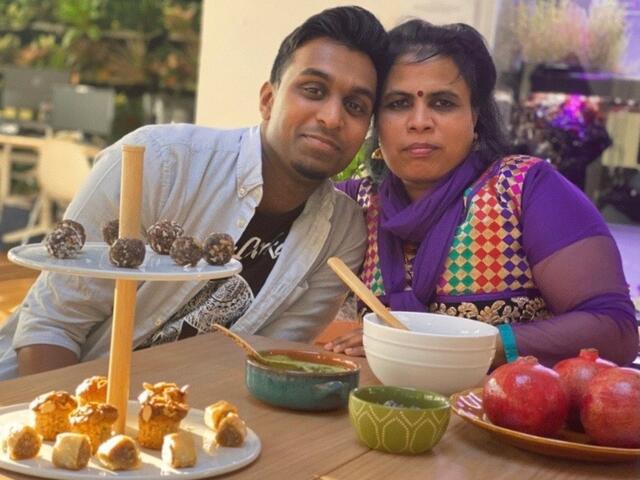
How did you learn how to cook?
Chef Shanthini: Shortly after I married, my husband and I were forced to flee Sri Lanka because of the war. We moved in with his brother in Lebanon. That’s who taught me to cook. Sarujen was born in Lebanon, but another war forced us to flee again, this time to Turkey, where I gained the confidence to cook on my own.
Because opportunities were scarce in Turkey, we applied for refugee resettlement. With the help of the IRC, we were able to move to the United States in 2013. That’s when I started cooking professionally, for a catering company in the Bronx, until the IRC connected me with Eat Offbeat.

What’s special about your jobs at Eat Offbeat?
Chef Shanthini: When I used to work at a restaurant, I had to follow a recipe and it was mostly American food, very different from what I cooked at home. Now I get to cook my own food.
Sarujen: Everyone that's working here came to this country in a similar way: we’re immigrants and refugees. Everybody's learning English. Our favourite thing about Eat Offbeat is just talking to our co-workers, and learning their languages and their food.
What is your favourite dish?
Chef Shanthini: Chicken biryani is my favourite dish to cook. With lots of veggies mixed in with the rice, you get all these flavors in one bite. It’s delicious.
Sarujen: My favourite, that my mom cooks, is crab curry. She prepares it differently than other dishes of hers, and also differently than other places. I’ve tried crab curries from different restaurants and I always get a taste of another curry I have tried in the past. But my mom's is unique.
If you could choose one dish to become more popular in America, what would it be?
Chef Shanthini: Dosas! I don’t see these in a lot of Indian or Sri Lankan restaurants here. It’s very disappointing to me because it’s such a well known dish in our country. I think if more people here tried it, they could understand our culture more.
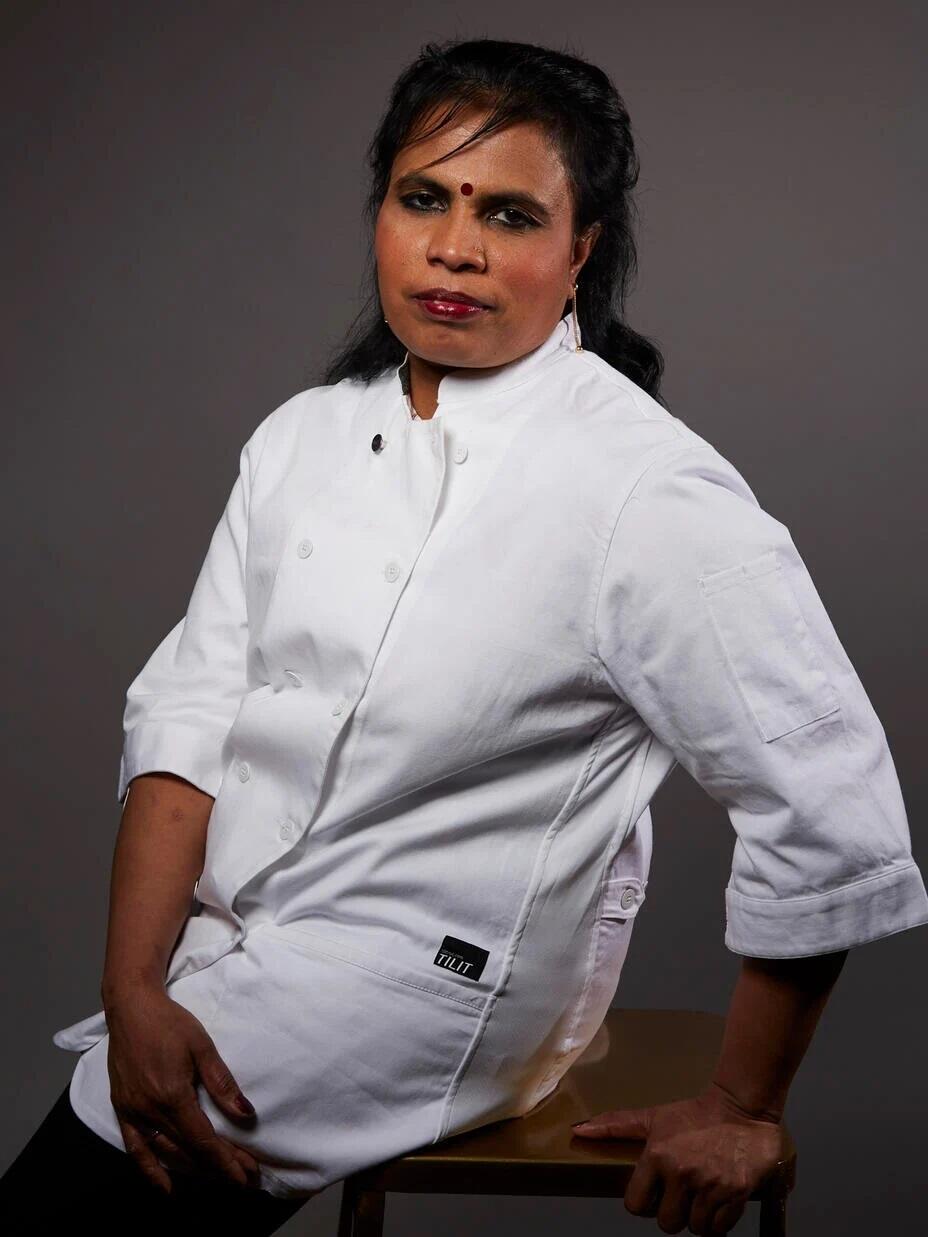
What are your favourite parts of living in New York City?
Sarujen: My first day here, I realised right away how diverse the city is. Everybody has their own neighbourhood; there’s space for so many different restaurants, food, faces and people.
Chef Shanthini: It was my childhood dream to go to the United States. I heard a lot about it growing up. So when I finally arrived, it was very satisfying to see everything for myself.
Have you learned about other types of cooking at Eat Offbeat?
Chef Shanthini: Yes, the other chefs are from all over the world and we all have to learn each other’s dishes. My favourite so far is chicken cilantro created by Chef Mariama from Senegal.
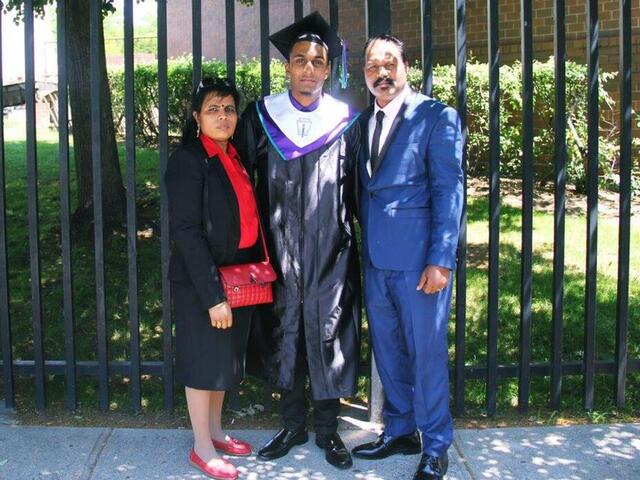
Sarujen, do you cook?
Sarujen: Some easy things. I’ve helped at work sometimes with my mom giving me directions over the phone.
Chef Shanthini (laughing): He fries eggs!
Sarujen: Yes, I make scrambled eggs a lot.
How does it feel to be in the cookbook?
Chef Shanthini: Very happy!
Sarujen: It’s very moving to see the things we eat at home, as a family, in the book.
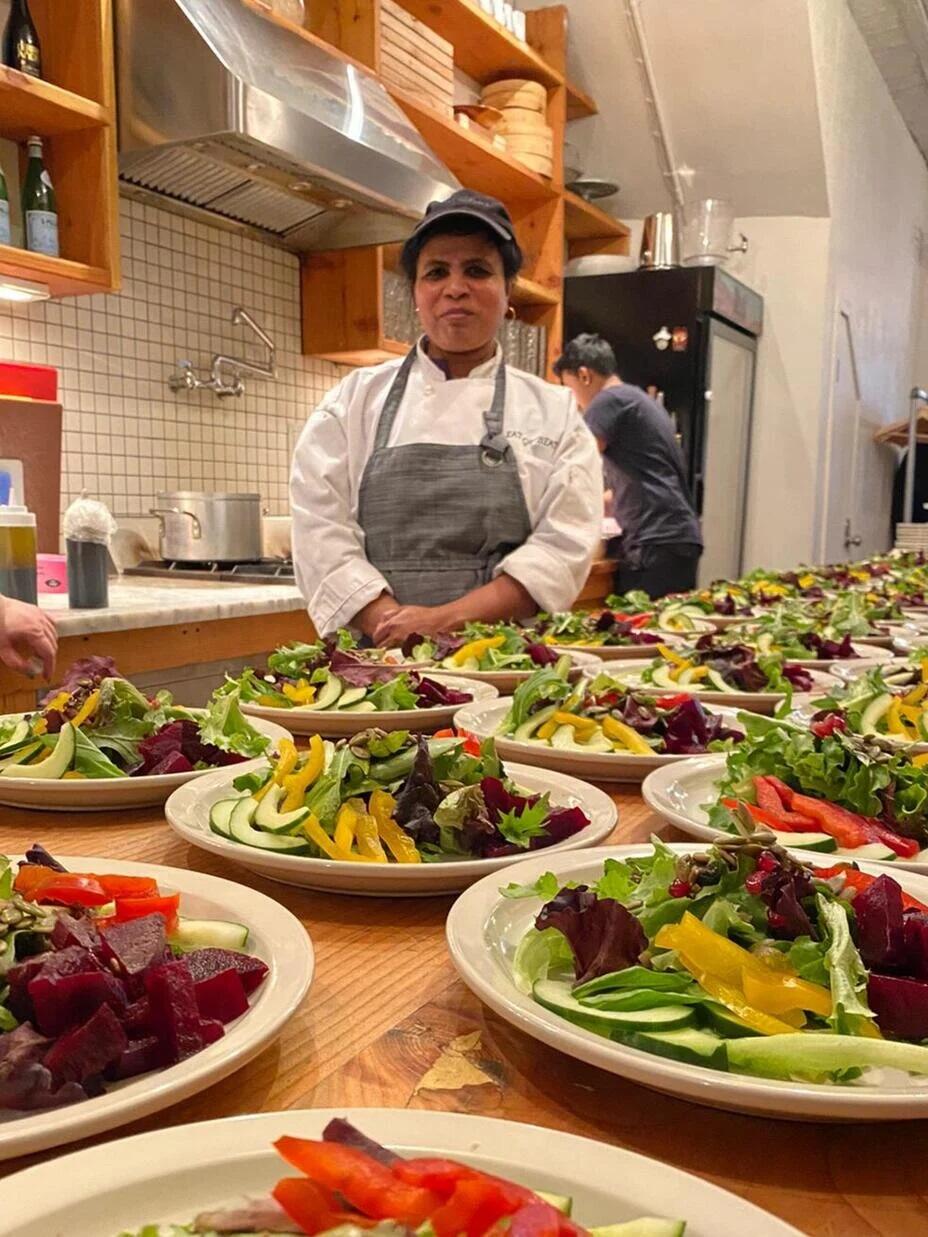
Chef Shanthini’s fried aubergine in creamy curry leaf, fenugreek and tomato sauce
Serves 4 to 6 as a main dish
This aubergine curry is a crowd favourite at Eat Offbeat. The aubergine slices need to sweat a bit prior to frying, which helps them crisp up better. If you have extra hands in the kitchen, the two aspects of this dish could be made simultaneously. Like most curries, this is best served over fresh basmati rice.
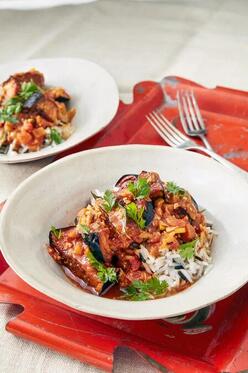
Ingredients
- 2 medium aubergine (about 2 pounds), cut into 2 x 1-inch planks
- 2 teaspoons ground turmeric
- 1 tablespoon, plus 2 pinches, kosher salt
- Vegetable oil, for frying
- 1 tablespoon fenugreek seeds
- 1 cup chopped yellow onion
- 10 curry leaves
- 10 garlic cloves, peeled and minced
- 2 tomatoes, diced
- 1 teaspoon chili powder
- 1 tablespoon ground cumin
- 1 tablespoon tomato paste
- 1 tablespoon freshly ground black pepper
- 2 tablespoons sugar
- Cooked basmati rice, for serving
- ¼ cup fresh cilantro leaves, for garnish
Directions
- Sprinkle the aubergine planks with 1 teaspoon of turmeric and 1 tablespoon of salt. Let the planks rest on a paper towel–lined plate for 15 minutes.
- To fry the aubergine, pour vegetable oil to a depth of at least 2 inches into a large stockpot or Dutch oven and clip a candy thermometer to the side, making sure it doesn’t touch the bottom. Heat the oil to 375°F over high heat, then lower the heat to medium to maintain that temperature during frying. While the oil is heating up, line a large plate with paper towels.
- Working in batches and using a slotted spoon, place the planks in the oil. Fry until all the sides turn golden, gently stirring, 2 to 3 minutes, and then quickly remove them with the slotted spoon. Place on the towel-lined plate. Set aside.
- Heat the fenugreek seeds in a small dry skillet over medium heat, just until they become fragrant, about 2 minutes. Remove the seeds from the heat and grind in a food processor or spice grinder. Set aside.
- Heat 2 tablespoons of oil in a large pot over medium-high heat. Once the oil is hot, add the onion and sauté until lightly browned, about 5 minutes. Add the curry leaves and garlic and sauté for 5 minutes. Add the tomatoes and a pinch of salt and cook for 5 minutes. Stir in the chili powder, cumin, and remaining 1 teaspoon of turmeric, then gently fold in the aubergine planks. Stir in 1 cup of water, another pinch of salt, the tomato paste, black pepper, and ground fenugreek seeds, and continue cooking for 5 minutes more.
- Remove the pan from the heat and stir in the sugar. Serve over rice, garnished with cilantro.
*From March 1, 2021, to March 1, 2022, (including any preordered copies that ship during this period), Workman Publishing will donate 2% of the cover price for every copy of The Kitchen without Borders cookbook sold in the United States and its territories, the United Kingdom, Canada, Australia and European Union member states, to the IRC, a not-for-profit organisation dedicated to providing humanitarian aid, relief and resettlement to refugees and other victims of oppression, conflict, or disaster, with a minimum contribution of $25,000 USD. For more information, visit rescue.org/cookbook and https://www.workman.com/kwob. No portion of the purchase price is tax-deductible. For additional information about the IRC, see rescue-uk.org.